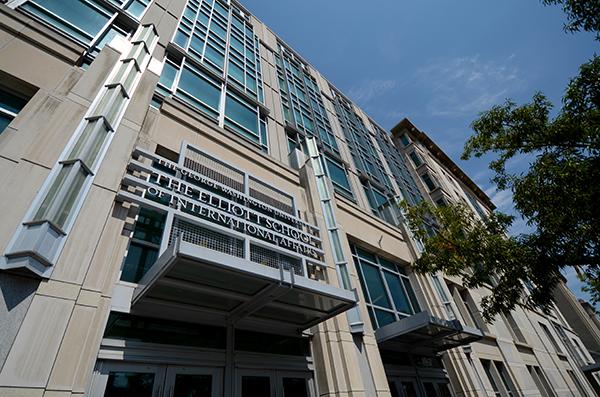When the new dean of the Elliott School of International Affairs arrives at GW this fall, faculty hope he can help to steer the already successful school to cover topics they haven’t yet had an opportunity to fully explore.
Faculty and experts said that Reuben E. Brigety II, the newly announced dean of the school, can utilize his expertise in African relations to bring new research centers and opportunities to students. They said this shift in the Elliott School is important, and said they consider Africa the next frontier in international affairs.
Brigety, who was named dean earlier this month and will start Oct. 1, served as the U.S. representative to the African Union and also worked as a deputy assistant secretary of state in the Bureau of African Affairs and in the Bureau of Population, Refugees and Migration. He was not available for comment.
He still serves as a permanent representative to the United Nations Economic Commission for Africa — a connection that experts and faculty said could help him build an overall focus on Africa within the school. Long-serving former Dean Michael Brown, who has a background in international security, stepped down from his role last October.
Prioritizing an important area
Harry Harding, who served as dean of the Elliott School for more than a decade before Brown, said Brigety is in a position to fill a “big gap” in the international affairs program at GW. He said the school developed programs focused around the communist world, as well as in Latin American and Middle Eastern studies, but has yet to highlight Africa.
The Elliott School currently offers a concentration in Africa for students majoring in international affairs, but no graduate programs in African studies. There are six courses within the international affairs school that specifically center on Africa.
“As the school grows, it’s great to be able to fill in those gaps that I was aware of 10 years ago,” Harding said.
But he also acknowledged the new dean has to play a balancing act in designing new programs centered on African studies with courses in other geographic regions. The dean will also have to work within the confines of his budget, Harding said.
“It’s difficult for anything but the very largest and richest universities to do everything, so you have to pick and choose,” he said.
Jennifer Brinkerhoff, a professor of public administration and international affairs who chaired the search committee for the new dean, said she and other professors who teach classes and conduct research related to Africa have met to work on expanding African studies in the school, as current courses are “under-enrolled.”
“Those with a committed concern for the continent are likely to look for schools that offer more than we can with our current faculty resources,” Brinkerhoff said in an email.
She said Brigety could add to the expansion of Africa relations courses, and said that expertise could motivate donors who are also interested in Africa to support the school’s programs.
Susan Aaronson, a research professor, said Brigety’s background working in development and organization within international affairs will serve him to work well with all faculty and programs within the school.
“With a new dean, especially one experienced in developing, analyzing and negotiating international affairs, we have an opportunity to build upon the excellence of GW’s existing curriculum and update it with new issues,” Aaronson said in an email.
The next frontier
Philip Altbach, the director of Boston College’s Center for International Higher Education, said that it has often been difficult for universities to form official partnerships with African universities because Africa has the lowest participation rate in higher education across the world.
“Very few U.S. institutions have programs with African universities in part because the African universities aren’t that stable, don’t have many resources and it’s hard for U.S. institutions to partner,” Altbach said.
However, some experts say the University’s selection of someone seasoned in African affairs is beneficial to the Elliott School because Africa is becoming increasingly popular for international affairs scholars.
Bonny Ibhawoh, a professor of African history at McMaster University in Ontario, said he has seen a “trend in growing interest” in Africa-centered programs recently, as scholars and students across the world see the possibilities for the future of the continent.
“Africa has long been neglected in international relations, but now we’re beginning to see interest in Africa from a development perspective, an economic perspective, as well as from a scientific, cultural, technology perspective,” Ibhawoh said. “The reason is we’re seeing emerging economies in Africa.”
He said educating students in international affairs schools specifically about Africa is beneficial because countries in Africa are now developing economically and politically.
“Students should pay attention in university because Africa is the future. If you look at the demographics for population, the number of young people in Africa is the highest population of young people in the world,” Ibhawoh said. “In the future, it is going to be full of activity.”







